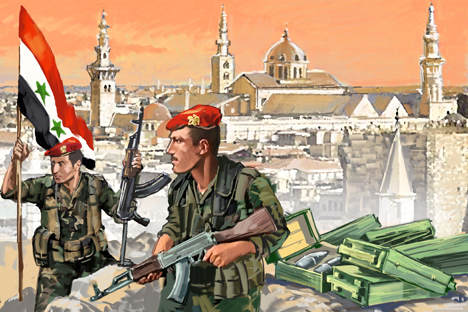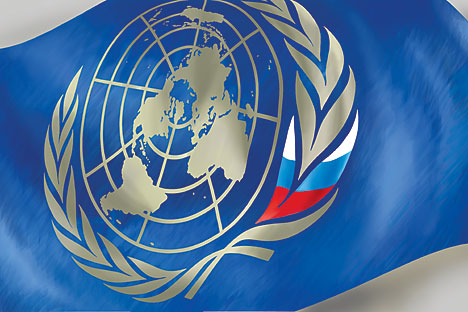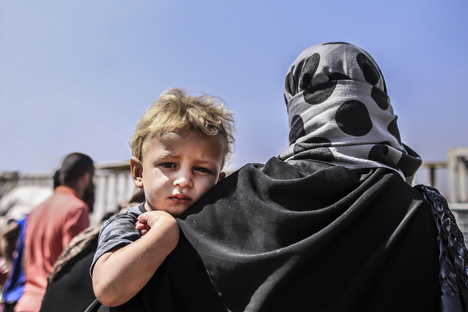Creating a defensive 'island' in Syria against ISIS

Click to enlarge the cartoon. Drawing by Tatiana Perelygina
When protests erupted in Syria in 2011 against the authoritarian rule of a religious minority led by President Bashar al-Assad, opinions about what awaited the country were divided.
Commentators in the West, Turkey and the Gulf expected an imminent collapse of the regime in Damascus along either Tunisian or Libyan lines - internal revolt or via outside interference. Observers in Russia pointed out that the Syrian case was different from the others: a religiously mixed population, an effective army, a unified ruling class, and powerful support from Iran spelled a different trajectory.
Events that followed showed that Moscow had a better understanding of Syria’s nuances. The position adopted by Russia (unwavering support for official Damascus and opposition to any outside interference) turned out if not advantageous, then at least the most consistent.
Between 2011 and 2015, the situation in the country, of course, deteriorated but still ran counter to the forecasts of an inevitable revolutionary upheaval. Developments took many twists and turns, including coming close to a US war against Syria, a surprisingly smooth operation to remove and destroy chemical weapons, and endless attempts to unite the opposition and find a common platform between Assad’s opponents and supporters.
The ISIS effect
All of that is now in the past. The explosive emergence of Islamic State (ISIS) has utterly changed the rules. The old Syria no longer exists and it still remains to be seen whether it will be preserved at all in any shape or form.
Indirect evidence that Moscow has stepped up its military assistance to Damascus allows one to conclude that Russia has decided to take a far more active part in the crisis. The situation on the ground is confusing: all the actors are involved in multi-faceted conflicts. Assad’s forces are opposed to ISIS and what is traditionally described as the moderate opposition. ISIS is fighting Assad and the opposition. The opposition sees everyone else as enemies. None of this takes into account the Kurds, who are waging a war of their own against Turkey, which under the guise of fighting ISIS is trying to resolve the Kurdish issue.
Hopeless divisions
To expect this fractured mess to offer hopes of a Syrian settlement is utterly unrealistic - particularly since the international community is hopelessly divided on options for resolving the crisis.
In Syria, as in the Middle East as a whole, there can now be no “victory”. Russian diplomats always insisted that this was not about Assad but about the principle - "hands off, do no harm" - and that the main objective was to protect the status quo. This policy has not worked: there is no longer any status quo in Syria.
The Western view is that because of that procrastination, the door has been opened to ISIS, which ironically now represents the only effective force opposing Assad. The Russian view is that Western stubbornness has undermined the chances of a soft transformation of the Syrian authorities. In any event, the question now is whether it will be possible to prevent ISIS from entering Damascus, which would have a most powerful propaganda effect.
Damascus is one of the cultural and historical capitals of the Arab world, part of European civilization's heritage. Its surrender would symbolize an irreversible retreat of modernity from the Middle East. Tens and now hundreds of thousands of refugees from the region that have flooded Europe have realized this: where the future is painted in ISIS colors, there is no place for modern and forward-looking people.
'Alawite Israel'
In what case could Russian efforts be considered a success? Realistically speaking, only if a de-facto equivalent of an “Alawite Israel” is created, an enclave that – with outside support – would be capable of self-defense and that would serve as an obstacle to an uncontrolled spread of ISIS. The comparison is, of course, a very loose one but the mechanism is similar.
Numerous diplomatic contacts that took place in the summer, when Moscow received a string of visitors from the Middle East, lead one to conclude that the current busy activity on Russia’s part should come as no surprise. Moscow’s readiness to undertake risks for the sake of preserving an “Alawite Israel” is in the interests of everybody except ISIS.
Still, Western leaders voice dissatisfaction and concern at an increased Russian military presence in Syria, while calling for a decisive intervention in order to defeat ISIS, as British prime minster, David Cameron did recently.
If one believed that Islamic State could be defeated and that after it there would start yet another struggle for control over Syria, then Western concerns would be justified: they really would not want Russia to have a claim for a serious role in a future Syria. However, a far more realistic scenario is that ISIS will not be defeated by the international coalition and that Syria will not be resurrected on new foundations but that the Islamists’ opponents will create a stronghold in limited territories and will continue to fight for their survival.
In that case, it would make sense for the West not to hinder Russia’s actions but to assist them, if possible. However, the whole of the Middle East’s recent history and the attitude outside forces have to the region suggest the West has all but lost the ability to analyze what is happening without investing it with ideological bias and personal feelings.
The author is the editor in chief of Russia in Global Affairs and chairman of the Presidium of the Council on Foreign and Defense Policy, a non-governmental think tank.
First published in Russian in Gazeta.ru.
All rights reserved by Rossiyskaya Gazeta.
Subscribe
to our newsletter!
Get the week's best stories straight to your inbox


